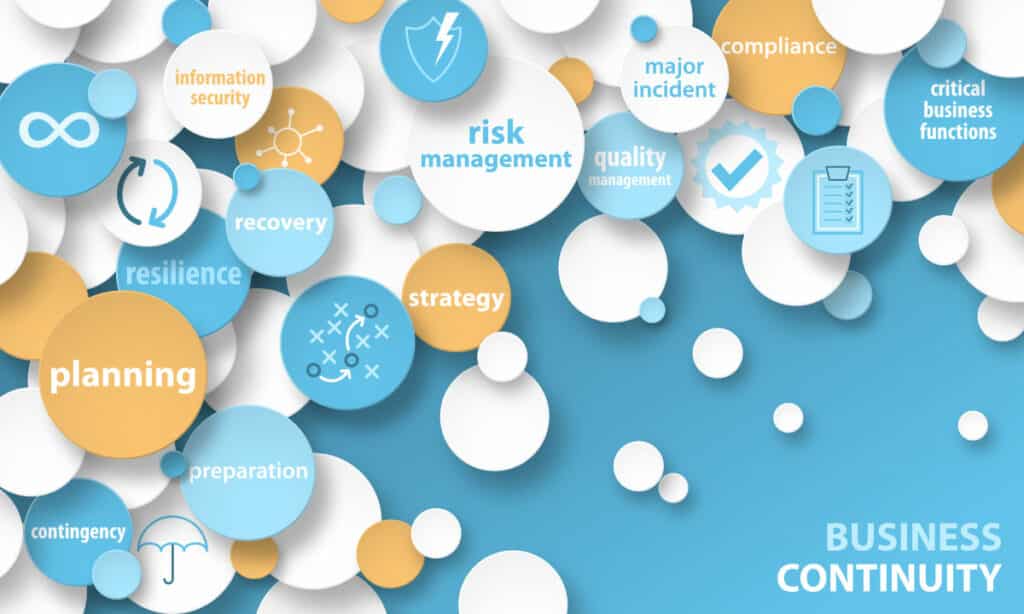Did you know 96% of businesses have experienced at least 1 outage in a 3-year period?1 And while the percentage of businesses who backup their data is very promising at 93%2, it’s still essential to underscore the importance for not only backing up your business data, but having quality disaster recovery and business continuity plans in place.
In this article, you’ll learn about the fundamentals of backup, disaster recovery and business continuity and how they can help your business stay up and running when your back is up against the wall.
Let’s start with the basic idea of data backup…
What are backups and why are they important?
A backup is simply copying data to another location for safekeeping. The data can be stored onsite, offsite, or in the cloud. However, because backups are vital to keeping your business functioning in the event you lose your data on your everyday devices, it’s extremely important to keep your backups in a secure and separate location away from your main infrastructure. Doing so will reduce the risk of having your backup destroyed when your main data becomes compromised. It is also important to conduct backups on a daily basis. Regular daily backups will ensure you only lose up to a day of data rather than weeks or months of it.
Okay, so what’s Disaster Recovery?
While Backup is just the simple act of backing up data regularly, Disaster Recovery (BDR) is a complete plan for how to recover from a major disaster, such as a fire, hardware failure, or cyber attack. BDR not only includes having a backup of all critical data and systems, it also includes procedures for how to quickly get everything up and running again.
Got it, so how does this relate to business continuity?
You can think of Business Continuity as the overall program that encompasses Backup and Disaster Recovery. However, while BDR is very reactive in its nature, business continuity takes a more proactive approach and focuses on keeping your business running during and after a disaster.
What does a business continuity plan look like?
A business continuity plan (BCP) will be different for every business, as it should be customized to fit the specific needs of that company. However, there are some key components that all BCPs should have.
First, you need to identify which systems and processes are critical to your business. This includes things like your financial system, inventory management, order taking, etc. Once you’ve identified these critical components, you need to develop plans for how to keep them running in the event of a disaster. This might mean having duplicate systems in place, or developing procedures for quickly getting everything up and running again.
It’s also important to have a communication plan in place so you can quickly let your employees, customers, and other stakeholders know what’s going on and what to expect. This might include things like setting up an alternate way to communicate if your primary methods are down, or having a list of key contacts who can help spread the word.
Finally, you need to regularly test and update your BCP. This includes testing your backup and disaster recovery systems to make sure they’re working properly, and updating your plans as your business changes and grows.
Doing all this is easier said than done, however. It’s important to know when to get help.
When to get help
Many small and medium sized businesses in Utah lack the knowledge and resources to effectively manage their backups and develop plans for disaster recovery and business continuity. That’s why many businesses choose to outsource the task to a Managed Services Provider, or IT company.
A qualified IT company in Utah that offers Managed IT Services will be able to assess your business’s unique technology infrastructure and develop custom plans that can minimize the impact of cyberattacks, natural disasters, hardware failure, and employee mishaps on your business operations.
At Simple Systems, we proactively managed these types of plans for our customers. Doing so allows them to focus on doing what they do best — running and growing their business. From cyberattacks to hardware failure, we’ve helped our clients stay operational by properly preparing them for such situations and responding to them when they inevitably happen.
For more information, please feel free to give us a call or schedule a consultation.


